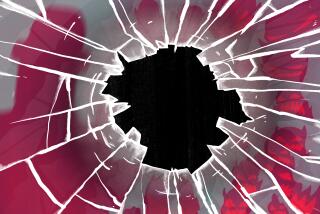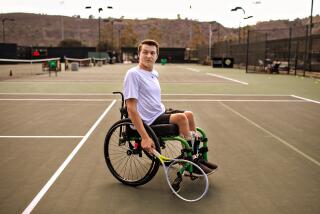A Lifetime Full of Challenges : A $4.75-million settlement eases only fiscal worries of quadriplegic boy’s family
- Share via
At 2 years old, Marc Buchholz is unable to sit up, kick his legs, hold a toy or even breathe for himself.
A ventilator-dependent quadriplegic, the child spends his days lying on the bed shaped like a sports car that his father built. A tube connects his trachea to a ventilator next to the bed, and a nurse monitors the apparatus 24 hours a day.
Marc will require the ventilator to breathe for the rest of his life, as he has since the day of his birth, when a spinal cord injury, which has never been precisely diagnosed, left him paralyzed.
For all his physical problems, though, Marc is a bright, alert and mentally capable child. He can recite the alphabet, count to 13 and spell his name, “mom,” and other words, although his letters, words, and numbers are spaced strangely, coming out one at a time between each ventilator pump.
His parents, Donna and Andreas Buchholz of Altadena, are determined to raise him at home and give him every opportunity for a full, productive life.
Such an undertaking is expensive. Already, the family’s $1 million in private medical insurance benefits have dwindled to almost nothing. But now, after two years of uncertainty, the Buchholzes know they will have the financial means to do it.
Three weeks ago, bringing a sudden end to a trial of almost two months, the Buchholzes accepted $4.75 million to settle a medical malpractice lawsuit against Glendale Adventist Medical Center, where Marc was born, and three physicians who cared for him during and after his birth. A fourth physician was cleared by a jury in the case.
The settlement money--minus the undisclosed lawyers’ fees--will be placed in a trust that will generate about $23,000 a month for Marc’s medical expenses for the rest of his life, said Carl A. Mc Mahan, the attorney who represented the Buchholzes.
That will pay for 24-hour nursing, ventilators, wheelchairs and private training. Most important, it means that the Buchholzes, who are both 29, can continue to care for Marc in their home--a dream that seemed perilously in doubt before the settlement.
Now the couple will need to draw on reserves of more than money.
Raising their child--coping with his special physical needs and helping him come to terms with his physical limitations--will require a boundless supply of patience, love and dedication, say experts who work with the extremely small number of parents in California who take on the challenge that faces the Buchholzes.
“You turn their home into a semi-hospital,” said Frank DeBernardi, chief of Medi-Cal’s field services branch, who oversees support programs for about 150 families with ventilator-dependent children. “There is machinery going around the clock, nurses changing things all night long. It can be an extremely stressful environment.”
“It’s not going to be easy,” Donna Buchholz said. “But at least we know he will be taken care of medically now.”
At 2 years old, when most children are going on outings to the park, Marc’s most regular activities are his doctors’ appointments and medical treatments.
At least twice a month, Marc visits physicians who are monitoring his cardiovascular system and urinary tract, both of which can develop serious problems as a result of his immobility.
Because he had a tube down his throat for the first two months of his life, Marc “is very defensive about his mouth,” his mother said, and is reluctant to eat. Now he receives most of his nutrients through a feeding tube. He also needs special plastic body support jackets to sit upright properly.
The Buchholzes have a nurse on duty around the clock, and every four hours the nurse pats down and suctions Marc’s lungs and trachea, removing moisture that could contribute to pneumonia. The nurse also exercises the child’s limbs to maintain his circulation and prevent blood clots.
The nurse’s most important task, though, is to monitor the ventilator and Marc’s breathing. That the ventilator might stop--from an earthquake, a power outage or a mechanical failure--is a constant worry for the family.
The machine has several alarms that sound if something is wrong, although the Buchholzes have had to learn not to come running at the first alert. Usually, the alarm signals that the ventilator tube has popped out of Marc’s trachea, a problem that the nurse can rectify in a moment.
But Andreas Buchholz said: “If I hear that thing for five seconds, I am running into the bedroom.”
Earlier this summer, the mechanical ventilator failed completely. Bolting into her son’s bedroom, Donna Buchholz found the nurse pumping air in and out of Marc’s lungs with a manual ventilator, known as an Ambu bag.
While the nurse operated the Ambu bag, Donna Buchholz brought out her son’s wheelchair, which has a portable ventilator on the back, and hooked him up to the machine. It was a frightening reminder of just how precarious their son’s hold on life is.
Before they slept that night, the Buchholzes waited for an emergency medical supply company to deliver another ventilator as a backup. The memory is not easily forgotten.
“We always wake up in the middle of the night to listen to the ventilator, to make sure it’s still going,” Andreas Buchholz said.
Despite the ongoing tension, the Buchholzes said they would never consider sending their son to an institution.
For both Donna, a homemaker, and Andreas, a draftsman, a happy family life--not career advancement, not material wealth--has been their primary goal. They said they still intend to have the most normal family life possible under the circumstances, and Donna Buchholz is pregnant with a second child.
“I can’t fathom how somebody could say, ‘I don’t want this child to be part of my life,’ because he didn’t turn out the way they wanted,” the father said.
Donna and Andreas Buchholz will never know exactly why their son was unable to breathe when he was born.
In their lawsuit, the Buchholzes contended that Marc was injured when the obstetrician, Dr. Juan Drachenberg, used a steel forceps to rotate Marc’s head and pull him out of the birth canal.
They believe that the injuries were exacerbated by the failure of physicians who treated Marc after birth to immediately diagnose a spinal cord injury and to stabilize his head and neck.
But, during a two-month trial in Glendale Superior Court, some medical experts testified that the injury could have occurred in utero, before Marc was born.
There was also testimony that Marc’s head showed no signs of a traumatic forceps delivery and that Marc was kicking immediately after his birth, which defense lawyers said indicates that he had not just suffered a severe spinal injury.
The question of how Marc was injured was never put before the jury. After two months of testimony--just as the case was about to go to the jury--the hospital and three of the four doctors settled for a total of $4.75 million. The jury found that a fifth doctor, who had not even seen the baby until eight days after his birth, bore no responsibility for the injury.
Defense attorneys said they decided to settle the case because they feared that the jury might hand down a much larger verdict out of sympathy for the parents.
Until the trial was over, the Buchholzes said that their life was “on hold.” Without any idea of how they would pay Marc’s medical expenses, they felt unable to make any plans for the future.
Now, though, they are beginning to think about where to send their son to school, and to prepare him for the rest of his life. Donna Buchholz plans to send her son to a special preschool for handicapped children and hopes that eventually he can be enrolled in public school.
Andreas Buchholz envisions a career in computer science for Marc, who could use a head pointer to stroke keys on a keyboard.
In the meantime, Marc has weekly sessions with an occupational therapist, whose current priority is to teach him to overcome his fears so he can eat.
When Marc gets older, the frequency of his physical therapy will increase. He will be taught to strengthen the muscles around his neck, to control his head and to use a head pointer, his mother said.
Marc enjoys outings, but every one is a major endeavor for his parents. When he goes, the ventilator, wheelchair, portable suction machine, portable oxygen unit, Ambu bag, feeding tube and the nurse must all go with him.
The trips are planned carefully, to be sure all the equipment is ready and that they are back in time for the nursing shift change.
“We have to plan a day in advance, to make sure the batteries for the ventilator and the portable suction machine are all charged up,” Donna Buchholz said.
Despite the difficulties, the Buchholzes try to take Marc out at least twice a week. He has been to the zoo, parks, shopping malls and the homes of his parents’ friends.
“He’s still our little boy, and we love him, and we want to make as normal a life as we can,” Donna said. “I see other people that are handicapped and they don’t let things stop them. They say, ‘I am still living, I need to be doing things with my life.’ That’s what we need to show Marc.”
Their task has been made easier, the Buchholzes said, by Marc himself.
When they first brought him home, they said, they did not know what mental impairments might accompany his physical condition. They have been thrilled to see the emergence of a bright personality and an apparently keen intelligence.
“He’s an inspiration to us,” Donna said. “He encourages me to give him encouragement. He brings a lot of joy into our life.”
Donna said that after her child was born, she felt a tremendous amount of resentment when she saw new mothers with healthy children. Once she broke down and wept at a K mart when she saw a mother yelling at a child in the store.
Even now, she occasionally becomes weepy when talking about her son, the injury, his prospects for the future.
“In a couple of years, how will I explain to him when he says, ‘Mommy, how come I’m not like the other kids?’ ” Donna Buchholz said. “I hope I am going to be able to be strong enough to keep him encouraged.”
More to Read
Sign up for Essential California
The most important California stories and recommendations in your inbox every morning.
You may occasionally receive promotional content from the Los Angeles Times.










